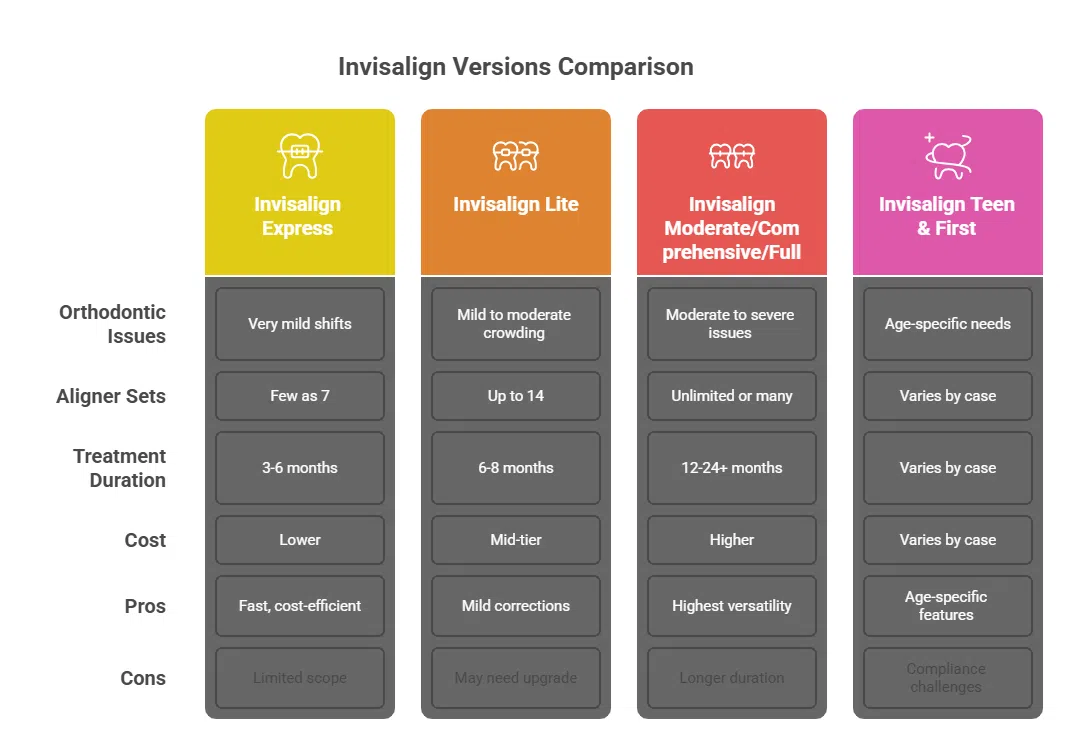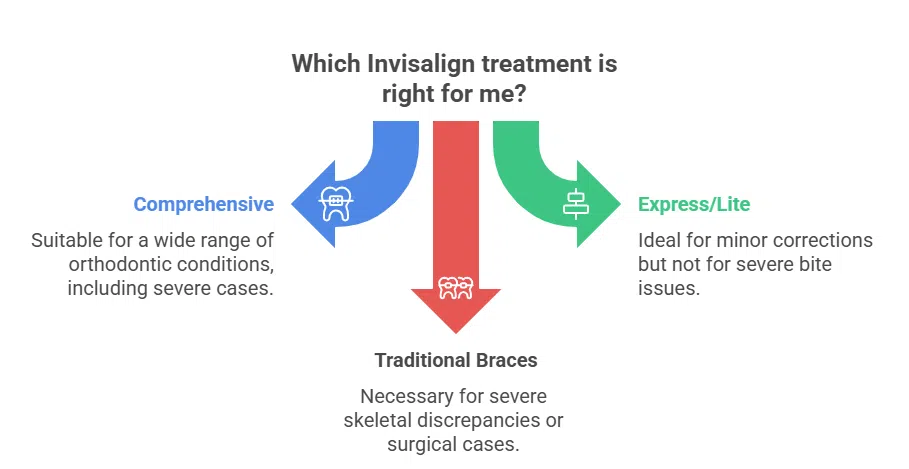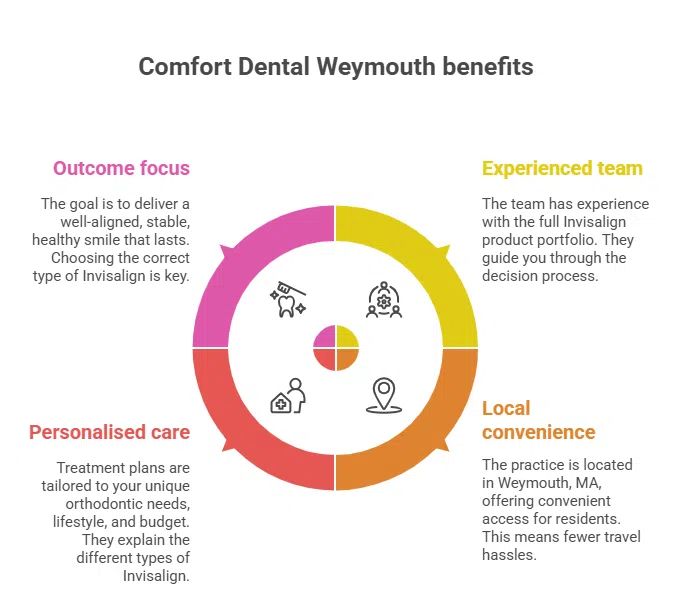If you’re considering clear aligner therapy at Comfort Dental Weymouth in Weymouth, MA, one of the first questions patients ask is: Are there different types of Invisalign? The answer is yes – there are several specialized versions of the Invisalign system designed to accommodate different ages, orthodontic conditions, treatment durations and budgets. In this article we’ll walk you through each of the common types, explain how to determine which is right for you, discuss how your case severity affects the choice, and give you practical take-aways for your first consultation.
What is Invisalign and why does it come in different types?
A brief overview of Invisalign
The brand Invisalign, manufactured by Invisalign (under Align Technology), uses a series of clear, removable aligner trays made from SmartTrack® material to gradually move teeth into their desired positions. Because every smile and bite is unique, treatment needs vary. That’s why Invisalign offers a “portfolio” of treatment packages tailored to mild, moderate or complex cases — and for children, teens and adults.
Why different types matter
Not every patient requires the same level of correction. Some seek minor cosmetic tweaks; others need significant bite correction or extraction-based treatment. By selecting the appropriate “type of Invisalign” for your situation, your provider at Comfort Dental Weymouth can optimise treatment length, cost and predictability. For example:
- Minor alignment issues → a shorter, less expensive variant.
- Moderate to severe issues → the full-scope version.
Using the right variant means you don’t “pay for” more than you need, but also that your treatment isn’t under-powered for what’s required.
The Major Types of Invisalign – At a Glance
Here we outline the most commonly referenced versions of Invisalign, what they are used for, and how they differ.
Invisalign Express (also known as Invisalign i7 or “very minor movement”)
- Designed for very mild orthodontic issues: small shifts, minor relapse, anterior cosmetic enhancements.
- For example, Invisalign i7 uses as few as 7 aligner sets.
- Typically shorter treatment duration (3-6 months) and lower cost.
Pros: Fast, cost-efficient, minimal lifestyle disruption.
Cons: Only suitable for very minor issues; cannot address deep bite, significant crowding or bite corrections.
Invisalign Lite (mild to moderate correction)
- Mid-tier option: for patients with mild to moderate crowding/spacing, simple bite issues.
- Often up to 14 or so aligners, treatment around 6-8 months (varies case to case)
Best for: Adults with mild alignment corrections, pre-restorative adjustments (e.g., before veneers or crowns).
Consideration: If your case turns out more complex than anticipated, you may need to upgrade to a “full” variant — pre-consultation at Comfort Dental Weymouth will help determine appropriateness.
Invisalign Moderate / Invisalign Comprehensive / Invisalign Full
- This is the “complete” treatment package, suited for moderate to severe orthodontic issues: significant crowding, spacing, over/under/ cross-bite, extraction cases, complex bite problems.
- Unlimited or many aligners allowed; treatment length can be 12-24+ months depending on complexity.
Advantages: Highest versatility, broadest scope of movement, suitable for complex cases.
Trade-offs: Longer duration, higher cost, requires strong compliance (aligners worn 20-22 hours/day)
Invisalign Teen & Invisalign First (age-specific options)
- Invisalign Teen: Designed for adolescents – includes features like blue wear indicators, eruption tabs for molars, and replacement aligners in case of loss.
- Invisalign First: For younger children in mixed dentition (some baby teeth still present) to guide jaw development and alignment early.
Why age-specific variants? Younger patients have different growth dynamics, erupted teeth, and compliance patterns; these versions cater accordingly.
How to Choose the Right Type at Comfort Dental Weymouth
Step 1 – Assessment of severity and goals
At Comfort Dental Weymouth in Weymouth MA, our team begins with a comprehensive orthodontic evaluation: we examine crowding, spacing, bite relationships (Class I, II, III), arch form, and growth stage (for younger patients). The treatment variant (“type”) of Invisalign then aligns with your diagnosed needs. For example, Invisalign Comprehensive will be recommended if you have a Class III under-bite or require extractions; a Lite or Express variant might suffice for minor spacing corrections.
Step 2 – Age and growth considerations
- If you’re an adult: adult variants (Express, Lite, Full) apply.
- If you’re a teen (typically 12-18): Invisalign Teen may be an ideal choice with features built for this age group.
- If you’re a child (approx. 6-10) and have mixed dentition: Invisalign First may be appropriate.
Your growth phase affects not only what variant is suitable, but also how treatment progresses and how predictable the results may be.
Step 3 – Duration and aligner quantity
Different types come with different aligner counts and durations. For instance, Express may use 5-14 aligners over 3-6 months; Lite may use ~14-20 over 6-9 months; Comprehensive may use 20-50+ aligners over 12-24+ months. Knowing your time horizon helps you pick the right plan.
Step 4 – Budget and cost considerations
Generally speaking, the more comprehensive the treatment (more aligners, longer duration, more complex mechanics), the higher the cost. At Comfort Dental Weymouth we will provide a transparent cost estimate for your specific case. Since you asked “Are there different types of Invisalign?”, yes — and the cost difference is one of the many differentiators.
For example, in a major US city the phrase “Invisalign” has average monthly searches around 8,100 in Boston, indicating strong demand and competitive pricing pressure.
Step 5 – Compliance and lifestyle fit
All Invisalign treatments require adherence: aligners must be worn for 20-22 hours daily, removed only for eating, brushing and flossing. The lighter variants (Express, Lite) have shorter durations — perhaps better suited for busy professionals who want a quicker turnaround. The full variants demand longer commitment. At Comfort Dental Weymouth, we’ll discuss your lifestyle and help match the treatment type to your available time and motivation.
Comparing the Types Side by Side
Here’s a comparative table to help clarify how the different types of Invisalign stack up:
| Variant | Typical Use-Case | Approx. Duration | Number of Aligners | Pros | Limitations |
| Express / i7 | Very mild movement, minor relapse | ~3-6 months | ~5-14 | Fast, cost-efficient | Only for very mild cases |
| Lite | Mild to moderate alignment, simple cases | ~6-9 months | ~14-20 | Balanced cost/time | Not for complex bite issues |
| Comprehensive / Full | Moderate to severe orthodontic issues | 12-24+ months | 20-50+ (or unlimited) | Broad capability | Longer time, higher cost |
| Teen | Adolescents (developing) | Variable | Similar to Lite/Full for teens | Teen-specific features | Not always used for complex adult cases |
| First | Children with mixed dentition, early intervention | ~6-18 months | Case-dependent | Early correction potential | Requires young patient/cooperation |
This overview confirms yes, there are different types of Invisalign, and selecting the right one matters.
What Issues Each Type Can or Cannot Address
Understanding the scope and limitation of each type is critical so you don’t embark on a plan that can’t fully correct your needs.
What Invisalign treatments can treat
According to Invisalign’s own site, key orthodontic conditions that can be addressed include: crowding, spacing, deep bites, open bites, under-bites (Class III), overbites (Class II) and certain extractions. Invisalign With the right variant (often Comprehensive), your provider at Comfort Dental Weymouth can treat quite a wide array of cases.
What some types cannot address
- Express or Lite variants may not be adequate for severe bite discrepancies or surgical cases.
- If a patient has a very narrow palate, severe skeletal discrepancy, or needs open-jaw surgery, traditional braces or combined orthodontic–surgical approach may be required.
- Realistic expectations are important: your orthodontist will evaluate and may recommend upgrading from a lighter variant if warranted.
Clinical decision-making at Comfort Dental Weymouth
At Comfort Dental Weymouth, we use digital scanning, 3D planning, and a full orthodontic diagnostic work-up to determine which type of Invisalign is appropriate for your case. We’ll discuss:
- Your bite classification (Class I, II, III)
- Amount of crowding/spacing
- Whether extractions are needed
- Growth stage (if adolescent or child)
- Your daily lifestyle and willingness to comply
All of these feed into whether you choose Express, Lite, Full, Teen or First.
Practical Tips for Patients Considering Invisalign at Comfort Dental Weymouth
Ask the right questions
When you come in for a consultation, these are some key questions you should ask:
- “Which type of Invisalign are you recommending for me and why?”
- “How many aligners will I likely need?”
- “What is my estimated treatment time for this variant?”
- “If my case is more complex, could I start with Lite and then need to switch to Full?”
- “What are the total costs and does the quote differ by variant?”
- “What happens if I lose an aligner or need additional aligners?”
- “Will this variant achieve both cosmetic alignment and bite correction (if needed)?”
Ensure you’re a good candidate
To maximize success:
- Wear your aligners 20-22 hours per day (removing only for eating/flossing).
- Attend follow-up check-ups at Comfort Dental Weymouth as scheduled.
- Use aligner attachments (small tooth-colored bumps) if recommended; these help certain movements.
- Maintain proper oral hygiene: brushing, flossing and keeping trays clean.
- Understand that “shorter” variants (Express/Lite) require equally rigorous compliance — the faster timeline demands high discipline.
What to expect during treatment
- Digital scans and treatment planning at start.
- Aligners changed typically every 1-2 weeks (or as directed by your provider).
- Occasional refinements: your orthodontist at Comfort Dental Weymouth may issue additional aligners if needed to perfect the result.
- Retention phase: once treatment is complete, a retainer is typically required to keep your teeth in their new position.
- Visual progress: many patients begin to see changes within a few weeks.
Cost and value
While cost varies by provider, variant and case complexity, the general rule is: shorter/less complex treatment = lower cost; longer/more complex treatment = higher cost. Since there are different types of Invisalign, your cost at Comfort Dental Weymouth will reflect the variant chosen. We provide transparent pricing, financing options, and insurance / payment plan support to help you choose the right option for your budget.
Local Benefits – Why Choose Comfort Dental Weymouth for Invisalign in Weymouth MA
Experienced team
At Comfort Dental Weymouth, our team has experience with the full Invisalign product portfolio — Express, Lite, Full, Teen and First. We guide you through the “which type of Invisalign” decision to ensure you’re neither over-treated nor under-treated.
Local convenience
Being located in Weymouth, MA (ZIP 02474), our practice offers convenient access for residents of Weymouth and the South Shore region. Choosing a local provider means fewer travel hassles and better continuity of care throughout treatment (especially if you’re on a variant that lasts 12+ months).
Personalised care
Rather than a one-size-fits-all approach, we tailor your treatment plan — including variant choice — to your unique orthodontic needs, lifestyle and budget. We explain upfront: Are there different types of Invisalign? Yes — and we help you choose the right one.
Outcome focus
Our goal is not just to sell a product, but to deliver a well-aligned, stable, healthy smile that lasts. Choosing the correct type of Invisalign is a key factor in that successful outcome.
Summary – Key Takeaways
- Yes, there are different types of Invisalign (Express/i7, Lite, Comprehensive/Full, Teen, First).
- The right variant depends on your orthodontic severity, age, treatment goals, budget and willingness to comply.
- At Comfort Dental Weymouth in Weymouth, MA (02474), we evaluate you thoroughly to determine the most appropriate type — ensuring you don’t pay for more than you need or choose a plan that won’t fully meet your needs.
- Ask questions, understand the aligner count, duration, cost and expected outcome for your variant.
- Compliance, good oral hygiene and retention after treatment are key to long-term success regardless of which type you choose.
Choosing the proper type of Invisalign is not just a matter of marketing — it’s a strategic treatment decision that affects duration, cost, comfort and final result.
If you’d like to book a free consultation with our team at Comfort Dental Weymouth and find out which type of Invisalign is right for you, we invite you to get in touch today.
“People Also Ask” – 10 Questions & Answers
- What are the different types of Invisalign aligned treatments?
Answer: The major types include Invisalign Express (for minor movement), Invisalign Lite (for mild to moderate correction), Invisalign Comprehensive/Full (for more complex cases), Invisalign Teen (for adolescents) and Invisalign First (for children). - How do I know which Invisalign package is right for me?
Answer: At your initial evaluation we assess your tooth crowding/spacing, bite relationship (Class I/II/III), growth stage, and treatment goals. Based on that we recommend a variant — for example, if your case is mild you may need Express or Lite; if moderate or complex, Comprehensive/Full. - How many aligners are used in Invisalign Express vs other types?
Answer: Invisalign Express may involve as few as 5-14 aligners and 3-6 months of treatment; Lite might use ~14-20 aligners over 6-9 months; Comprehensive could involve 20-50+ aligners over 12-24+ months. - Is Invisalign Teen different from adult Invisalign?
Answer: Yes — Invisalign Teen has features tailored to teens: blue wear-indicators, eruption tabs for developing molars, additional aligner sets for lost trays. Adult versions may not include those teen-specific features. - Can children use Invisalign?
Answer: Yes – via the Invisalign First variant, which is designed for younger children with mixed dentition and early orthodontic issues. Early intervention can simplify future correction. - Does the cost differ between types of Invisalign?
Answer: Typically yes – because the variant determines duration, complexity and number of aligners. A shorter treatment (Express) cost will commonly be lower than a full comprehensive case. - Can a patient switch from a Lite to a Full Invisalign treatment if needed?
Answer: Yes – during treatment if your provider determines your case is more complex than initially thought, you may “upgrade” from a Lite to Full variant. At Comfort Dental Weymouth this is discussed in your treatment plan. - How long does Invisalign treatment typically take for each type?
Answer: Express: ~3-6 months; Lite: ~6-9 months; Comprehensive/Full: ~12-24+ months depending on case severity. - Will my insurance or dental plan cover different types of Invisalign?
Answer: Coverage depends on your insurer and the policy. Many plans cover clear aligner therapy generally; the specific variant (Express, Lite, Full) may impact cost-share. Our staff at Comfort Dental Weymouth can review your insurance benefits. - Does the type of Invisalign selected affect the long-term stability of the result?
Answer: The stability depends more on accurate diagnosis, proper treatment planning, patient compliance, and good retention after treatment. Selecting the correct variant that matches your needs helps ensure the result is more stable, rather than the variant alone.
Frequently Asked Questions (FAQs)
- Q: What is the simplest type of Invisalign available?
A: That would be Invisalign Express (or i7) – designed for very minor tooth movements using fewer aligners and a shorter treatment time. - Q: What is Invisalign Lite and who is it for?
A: Invisalign Lite is for patients with mild to moderate alignment issues who need more than Express but less than full comprehensive correction. - Q: What makes Invisalign Comprehensive or Full different?
A: Comprehensive (or Full) is designed for moderate to severe orthodontic issues including complex bite problems, extraction cases, or long-term movements. It typically involves many more aligners and a longer time. - Q: Can teenagers use the same Invisalign type as adults?
A: Teens often use Invisalign Teen, which includes teen-specific features; adults typically use the standard adult variants (Express, Lite, Full). - Q: How much shorter is an Express or Lite treatment compared to Full?
A: Express treatments may complete in 3-6 months; Lite in roughly 6-9 months; Full may run 12-24+ months depending on complexity. - Q: Does choosing a shorter variant reduce results quality?
A: Not if the variant is appropriately matched to your case. If you choose a shorter variant but actually need a full variant, results may be compromised — hence accurate diagnosis at Comfort Dental Weymouth is key. - Q: Will I know at the start how many aligners I will need?
A: Yes — during your digital scan and treatment planning we provide an estimate of aligner count, type of variant and expected timeline. - Q: If I lose an aligner, does that affect the type of Invisalign I’m using?
A: Losing an aligner may lead to replacement, which your provider may include. It doesn’t necessarily change the variant type, but may affect timing/cost. - Q: Are there any age limits for certain types of Invisalign?
A: While there are no strict age limits, certain variants (Invisalign Teen, First) are designed for younger patients; Express/Lite/Full are for teens/adults. Your provider will evaluate dental maturity rather than age alone. - Q: How much does version choice affect cost?
A: Quite a bit – because time in treatment, number of aligners, and complexity drive cost. Express costs less due to fewer aligners and shorter duration; Full costs more due to complexity and length of treatment.
Final Thoughts
If you’re asking “Are there different types of Invisalign?”, the short answer is yes — and choosing the right one is a key step in your orthodontic journey. At Comfort Dental Weymouth in Weymouth, MA (02474), our experienced team will guide you through identifying the most suitable variant, whether that’s Express, Lite, Comprehensive, Teen or First. With accurate diagnosis, a clear treatment plan, and your commitment to compliance, you’ll be on track toward a beautifully aligned smile that lasts.
If you’d like to schedule a consultation or learn more about which type of Invisalign is right for you, please visit Comfort Dental Weymouth, 47 Washington St, Weymouth, MA 02188, (781) 337-3300.



